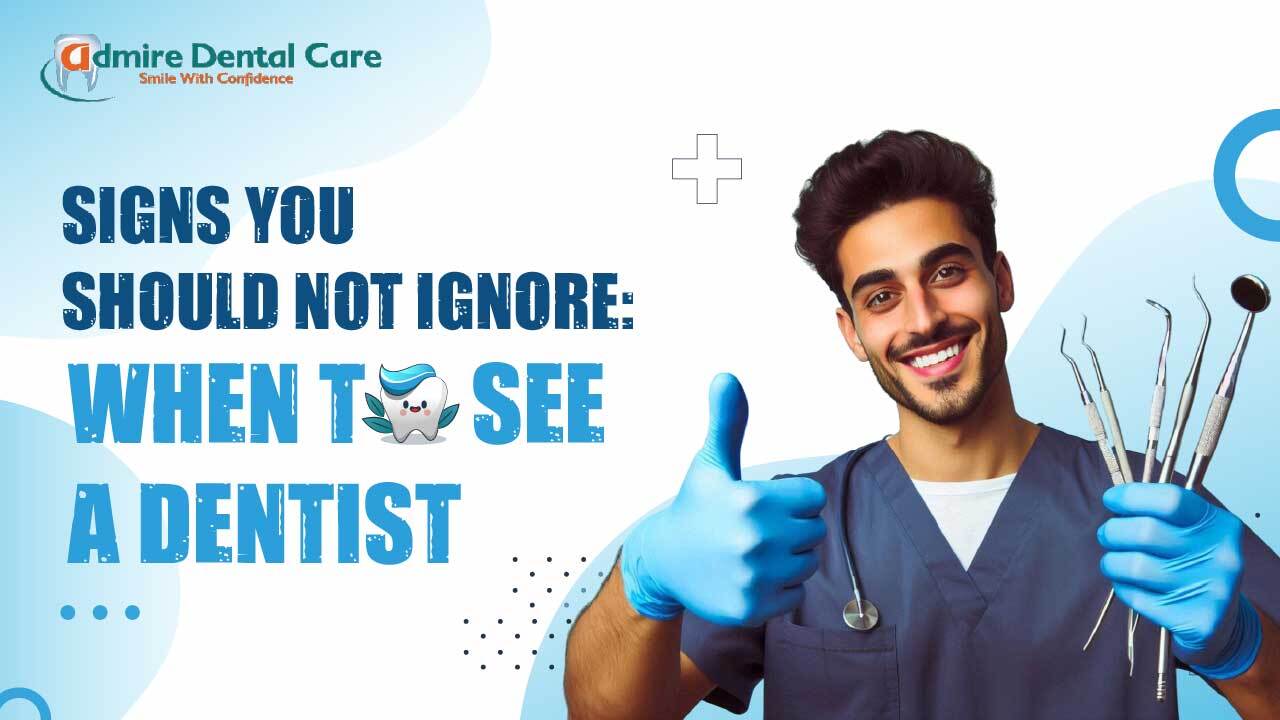Good oral health is crucial for your overall well-being. However, a lot of people choose to avoid dental issues until they get serious. Knowing the signs that are early warning will help you avoid discomfort or costly treatments and permanent harm to the gums and teeth. If you’re suffering from one of these symptoms then it’s time to see your dentist at Woodbridge Dental Care.
Here are 12 signs that indicate you need to see a dentist:
- You Have Pain
The pain in your teeth, jaw, or gums shouldn’t be overlooked. Whether it’s a sharp, throbbing pain or a persistent ache, it could indicate underlying issues such as cavities, infections, or gum disease. The swelling in your face, mouth, or neck can also indicate an infection that requires urgent treatment. If the pain is severe, you may need an emergency dentist in Woodbridge, VA to address the problem promptly.
- Your Gums Are Acting Up
Swelling, tender, or bleeding gums could be the first warning sign of gum disease which is also known as gingivitis. If left untreated, this disease can develop into periodontitis, which is a more serious type of gum disease and may result in tooth loss. If you experience bleeding gums during flossing or brushing make an appointment with your dentist as quickly as possible.
- You Try to Hide Your Smile
Being self-conscious about your smile could impact your self-confidence. Whether you have missing, discolored, or misaligned teeth, modern dentistry offers several solutions to restore your smile. Teeth whitening, veneers, implants, or orthodontic procedures will help you get an attractive, healthy smile.
- You’ve Had Work Done
If you’re using tooth fillings, crowns, implants, or dentures regular dental examinations are vital to make sure they’re well-maintained. With time, these dental restorations may wear down or loosen, which can lead to pain or damages. Regular visits to your dentist can aid in maintaining the durability of these procedures.
- You Have Ongoing Medical Issues
Certain medical conditions, such as cardiovascular diseases, diabetes, eating disorders, diabetes, or HIV could affect your oral health. In addition, medical treatments such as radiation therapy, chemotherapy, or hormone replacement therapy may affect gum health and teeth. It’s essential to inform your dentist about your medical history so they can tailor a treatment plan that suits your needs.
- You’re Pregnant
Pregnancy brings about hormonal changes that can increase the risk of gum disease and other dental issues. Expecting mothers may notice swelling gums, a higher level of plaque, and pregnancy tumors on the gums. Visiting your dentist during pregnancy ensures that these issues are managed effectively to maintain both maternal and fetal health.
- You’re Having Trouble Eating
The inability to chew or swallow food could indicate something is wrong with your oral health. Whether due to dental sensitivity, misalignment, or missing teeth, these problems can affect your ability to eat properly. Until you see a dentist, try consuming soft or liquid-based foods to prevent further discomfort.
- You Have Dry Mouth
Saliva plays a vital role in maintaining your oral health, by washing away food particles and neutralizing acid. If you experience frequent dry mouth, it may be caused by medications, dehydration, or other diseases. The dentist may recommend treatment to replenish the moisture levels in your mouth.
- You Use Any Kind of Tobacco
Tobacco use, whether smoking or chewing, significantly increases the risk of gum disease, oral cancer, and tooth loss. If you use tobacco products, it’s essential to schedule regular dental checkups to monitor for early signs of serious conditions. Your dentist can also provide guidance on quitting tobacco to improve your overall health.
- You’re Having Jaw Pain
Jaw pain, clicking, or popping sounds while opening and closing your mouth may indicate temporomandibular joint (TMJ) disorder. This condition can lead to headaches, earaches, and difficulty chewing. An uneven bite or teeth grinding may also contribute to jaw pain. Seeking dental care can help diagnose and treat the underlying cause of your discomfort.
- Your Mouth Has Spots and Sores
Persistent sores, white or red patches, or lumps in your mouth should never be ignored. While some sores, like canker sores, heal on their own, others could indicate infections or even oral cancer. If a sore lasts longer than a week, schedule an appointment with your dentist for a thorough examination.
- It’s Time for Your Checkup
Even if you don’t have any symptoms, regular dental checkups are essential for maintaining good oral health. Dentists can detect problems early before they escalate into severe issues. Routine exams include professional cleaning, cavity detection, and screening for oral diseases. Woodbridge Dental Care offers comprehensive checkups to ensure your teeth and gums remain in excellent condition.
Signs Your Teeth Are Falling Out
Loose or shifting teeth are a major red flag that should not be ignored. If you notice any of the following, you may be at risk of tooth loss:
- Receding gums
- Persistent bad breath
- Teeth feeling loose or moving
- Pus around the gums
- Increased sensitivity to hot or cold temperatures
If you experience any of these symptoms, visit an emergency dentist in Woodbridge, VA immediately. Early intervention can help save your teeth and prevent further complications.
Conclusion:
Your oral health is a vital part of your overall well-being. Ignoring dental problems can lead to severe consequences, including tooth loss and systemic health issues. If you experience any of the signs mentioned above, don’t delay in seeking professional dental care. Whether it’s for bleeding gums, emergency dental services, or regular checkup, your dentist is there to help you maintain a healthy and confident smile.



